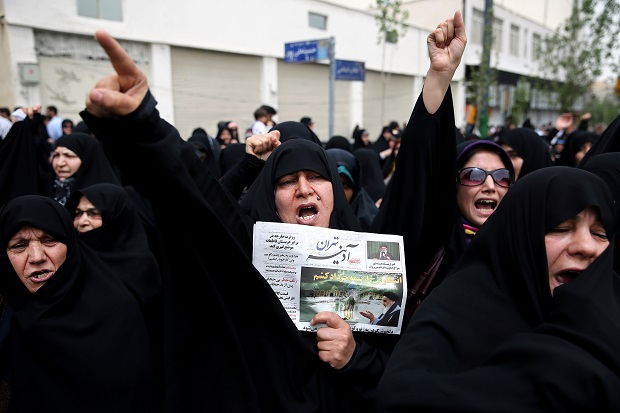Iran lawmakers ban nuclear inspectors from military sites

A group of Iranian worshipers chant slogans in a demonstration over negotiations with world powers on Iran’s nuclear program, after their Friday prayer, in Tehran, Iran. AP
TEHRAN, Iran — With some lawmakers chanting “Death to the America,” Iran’s parliament voted to ban access to military sites, documents and scientists as part of a future deal with world powers over its contested nuclear program.
The bill, if ratified, could complicate the ongoing talks in Vienna between Iran and the six-nation group — the U.S., Britain, France, Russia, China and Germany — as they face a self-imposed June 30 deadline. The talks are focused on reaching a final accord that curbs Iran’s nuclear program in return for the lifting of economic sanctions.
Of 213 lawmakers present on Sunday, 199 voted in favor of the bill, which also demands the complete lifting of all sanctions against Iran as part of any final nuclear accord. The bill must be ratified by the Guardian Council, a constitutional watchdog, to become a law.
The terms stipulated in the bill allow for international inspections of Iranian nuclear sites, but forbid any inspections of military facilities.
The bill states in part: “The International Atomic Energy Agency, within the framework of the safeguard agreement, is allowed to carry out conventional inspections of nuclear sites.”
However, it concludes that “access to military, security and sensitive non-nuclear sites, as well as documents and scientists, is forbidden.” It also would require Iran’s foreign minister to report to parliament every six months on the process of implementing the accord.
Iran’s nuclear negotiators say they already have agreed to grant United Nations inspectors “managed access” to military sites under strict control and specific circumstances. That right includes allowing inspectors to take environmental samples around military sites.
But Iranian officials, including Ayatollah Ali Khameni, have strongly rejected the idea of Iranian scientists being interviewed.
In a statement Sunday, the U.S. State Department said inspections remain a key part of any final deal.
All parties “are well aware of what is necessary for a final deal, including the access and transparency that will meet our bottom lines,” the statement said. “We won’t agree to a deal without that.”














